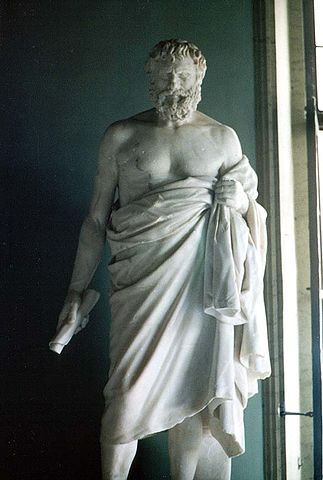I Am a Citizen of the World

It was sometimes applied to relinquishment of ownership and care of property. Diogenes is represented as writing to Crates; "I hear that when you left your country you brought all your property to the assembly and announced 'Crates, the son of Crates, sends Crates away a free man'" (9th Letter). The Cynic also regarded himself as free from the restraints of all human laws and customs. Maximus of Tyre says; "Who appears to you to be free? The politician? You say that he is a slave of many masters. The orator? You say that he is at the mercy of wrong decisions. The ruler? You say that he the slave of unbridled appetites. The general? You say that he is subject to reverses from unknown causes. The money-maker? A slave to the uncertainties of trade. The philosopher? What kind of philosophy? Indeed I praise Socrates, but I hear him saying, 'I obey the law. I go to prison voluntarily and take the poison 'voluntarily!' O Socrates, do you not see what you are saying? . . . Obeying the law, -what law? For if you mean the law of Zeus, I commend the law; but if you mean the law of Solon, in what was Solon better than Socrates? . . . Therefore I say that from this tyranny of circumstances the only liberation is that life which raised Diogenes above Lycurgus and Solon and Artaxerxes and Alexander and made him more free than Socrates" (Diss. 36, 6). Maximus Tyrius here appeals from the law of the state- the man made law- to the law of Zeus or natural law. Each Cynic interpreted the natural law for himself and was virtually a law unto himself. "Asked where he came from, he (Diogenes) said, 'I am a citizen of the world'" (D. L. 6, 63). "We should not give thanks to our parents- either because we were born, since creatures are generated by nature- nor on account of what we are, for this results from a combination of the elements. And there should be no gratitude for what comes by choice and purposes" (21st Letter of Diogenes). The law of nature, for the Cynics seems to have been a negation of existing laws rather than a separate code. The Cynics at Rome in the 1st century A.D. opposed the emperor as they had repudiated the governments of the city-states of Greece. This shows that their idea of cosmopolitanism was not satisfied with the universal rule of Rome and that they were anarchists.
Image: Statue of an unknown Cynic philosopher from the Capitoline Museum in Rome. Roman-era copy of an earlier Greek statue from the 3rd century BC.
Photo by LuciusCommons, Public Domain via Wikimedia Commons
Blogging Diogenes of Sinope by Farrand Sayre
The Cynics Referred to the Habits of Animals
Slump towards Animalism
Attitude of the Cynics Towards Pleasure
Happiness Did Not Exclude Pleasure
Diogenes as Hedonist
Short Road to Happiness or Short Cut to Virtue?
Despising Pleasure is Pleasurable
What is Virtue for a Cynic: Cats for Thievery
What is Virtue for a Cynic: Promiscuous Sexual Intercourse
The Cynic Sought Freedom
Labor Did Not Enter into the Cynic Scheme of Life
The Easy Life of the Cynic
The Cynic was Fond of Comparing Himself with Kings and Emperors
The Object of the Cynic was Happiness
Freedom of Speech is the Most Beautiful Thing in the World
An Excess of Infamy
I Speak Plainly as an Interpreter of Apathy
This post was resteemed by @steemitrobot!
Good Luck!
The @steemitrobot users are a small but growing community.
Check out the other resteemed posts in steemitrobot's feed.
Some of them are truly great. Please upvote this comment for helping me grow.
@cryptohustlin has voted on behalf of @minnowpond. If you would like to recieve upvotes from minnowponds team on all your posts, simply FOLLOW @minnowpond.
@mrainp420 has voted on behalf of @minnowpond. If you would like to recieve upvotes from minnowponds team on all your posts, simply FOLLOW @minnowpond.
@eileenbeach has voted on behalf of @minnowpond. If you would like to recieve upvotes from minnowponds team on all your posts, simply FOLLOW @minnowpond.
This post has received a 0.78 % upvote from @drotto thanks to: @banjo.